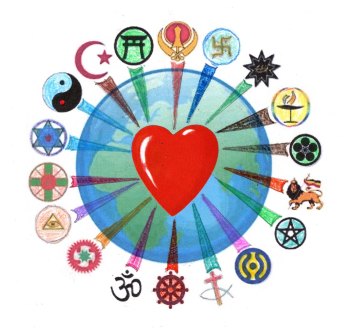Mini Love Lesson #296
Synopsis: Here we are urged to take a look at what various religions have to say about love and its doing, so as to make our own doing of love more effective. Religious teachings on love are recommended as a great source of wisdom, although with some cautionary considerations.
Most of the major religions have a lot to say about love. What religions have had to say about love has probably helped more people than psychology, philosophy, literature or anything else. Religious leaders of many faiths have given love a great deal of attention, contemplated love often, taught much about love and written many words concerning love. Most of that was in an effort to help us understand love better and do love well. Therefore, what religions have say about love is well worth considering.
Hinduism and Buddhism share The Four Great Immeasurable Ways of Love which have helped countless millions live more loving lives. Judaism offers the foundational law of love by proclaiming love your neighbor as yourself which has been an outstanding guide for thousands of years. In Christianity, St. Paul uses 16 terms to tell us how to do and not do love in his famous “love chapter” in his first letter to the Corinthians” which is read at more weddings than any other Bible passage in Christendom. In Islam all 114 Sutras (chapters) of the Koran begin with a stress on Allah’s most merciful and compassionate love which followers are to emulate in their lives. In Taoism, Lao Tzo taught the first great treasure of all treasures is love, and to courageously attack with love, and be secure in love as the strongest of defenses. Confucius put forward that the main guiding principles to live by is that of loving others which meant to care about and secure the welfare of those we love.
In studying what religious sages and leaders proclaim about love, we can see a common thread appearing. It is that love must be done not just felt. For love to have any effect, love actions must be taken. For love to work any of its wonders, loving behaviors must be accomplished. For love relating to occur, love must be conveyed and sent repeatedly. For love success to be the result, doing love actions skillfully and frequently is essential. All that suggests love is to be studied behaviorally, practiced behaviorally, improved behaviorally and frequently used behaviorally.
Whatever your religion, you can focus on what it says about love and probably learn some very helpful things to do which will make your actions of love better. If you have no particular religion, that suggests studying them all may be helpful. You can also do that if you are rather ecumenical and open to learning from them all, or at least more than one.
Do be a bit careful. In actual practice the followers of many religions have not abided by their own faith’s teachings about love. In fact, they have done quite the opposite and sometimes even have become the proponents of hate, indifference and what can be called anti-love behaviors. Hence, the potential for being led astray does exist.
Studying what religion has to say about love has aided an enormous number of people in doing love better, being better at relating with love and from love, and in forming love connected relationships, better than they would have otherwise. Religion could be, if it hasn’t already, be the fine source for learning to successfully, broadly, deeply and wisely enrich your dealings and doings with love.
One more little thing: Why not talk over this little love lesson and its ideas with someone else? That might help you learn a lot more from it and from them too. If you do that, please mention this site and its many mini-love-lessons.
As always Go and Grow with Love
Dr. J. Richard Cookerly
♥ Love Success Question: What do you think of the dictum “To get an abundance of fine love, give it in abundance and do it as skillfully as you can – often”.


No comments:
Post a Comment